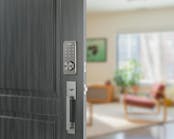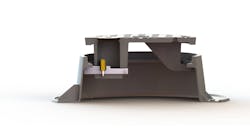About 15 years ago during a meeting with the legendary A.J. Hoffman, the future of keys and mechanical lock cylinders was discussed. A.J. firmly believed that the wide usage of metal keys and tumbler locks would always exist.
Assa Abloy staged an impressive presentation during the recent International Security Conference (ISC) in Las Vegas. The same question about the future of keys was mentioned by Assa Abloy during their presentation. Assa Abloy officials stated that presently about 5 percent of existing lock hardware is electronically operated, while 95 percent of the existing hardware uses some type of mechanical key and tumbler locking system. Assa Abloy expects these percentages to drastically change over the coming years.
You might guess that keypads, biometrics, retina scans or smart cards will become the future credential of choice but according to the Assa Abloy presentation, the credential of the future may well be your cell phone. There will soon be a new phrase added to the locksmith vocabulary; near field communication (NFC).
Major companies such as Assa Abloy and Ingersoll Rand already have NFC-based access control hardware operating at test sites. Colleges and Universities are the best current places to test cell phone access control systems because almost every student carries a cell phone. The current stumbling block is that NFC only works with a smart phone. Estimates are that in the next two years approximately 11 million users will trade in their old cell phones and purchase a smart phone. The NFC era will then be on its way.
Interestingly, Assa Abloy officials did not mention much about the future of the mechanical cylinder lock. They did mention that smart cards are, "not going away any time soon." Since 100 percent of the population may never own a smart phone, Assa Abloy implied that future locking credentials will be a combined usage of smart cards and smart phones, with mechanical locking systems accounting for a much smaller percentage of the total.
A live demonstration during the Assa Abloy presentation showed how easy it is to add a cell phone to an access control system. An app is installed on the smart phone, and software is used to initially begin connectivity. The cell phone is held near the lock for a moment to be synchronized and the hook-up is complete. From then on, whenever the phone is held near the lock reading sensor, the door will automatically unlock.
Although many companies at the ISC convention displayed similar NFC cell phone systems, you will probably not see them in general usage until more smart phones are sold. Cell phone popularity has wiped out the pay phone industry. It remains to be seen how cell phones will affect the positioning of mechanical pin tumbler locks on the bell curve life cycle.





